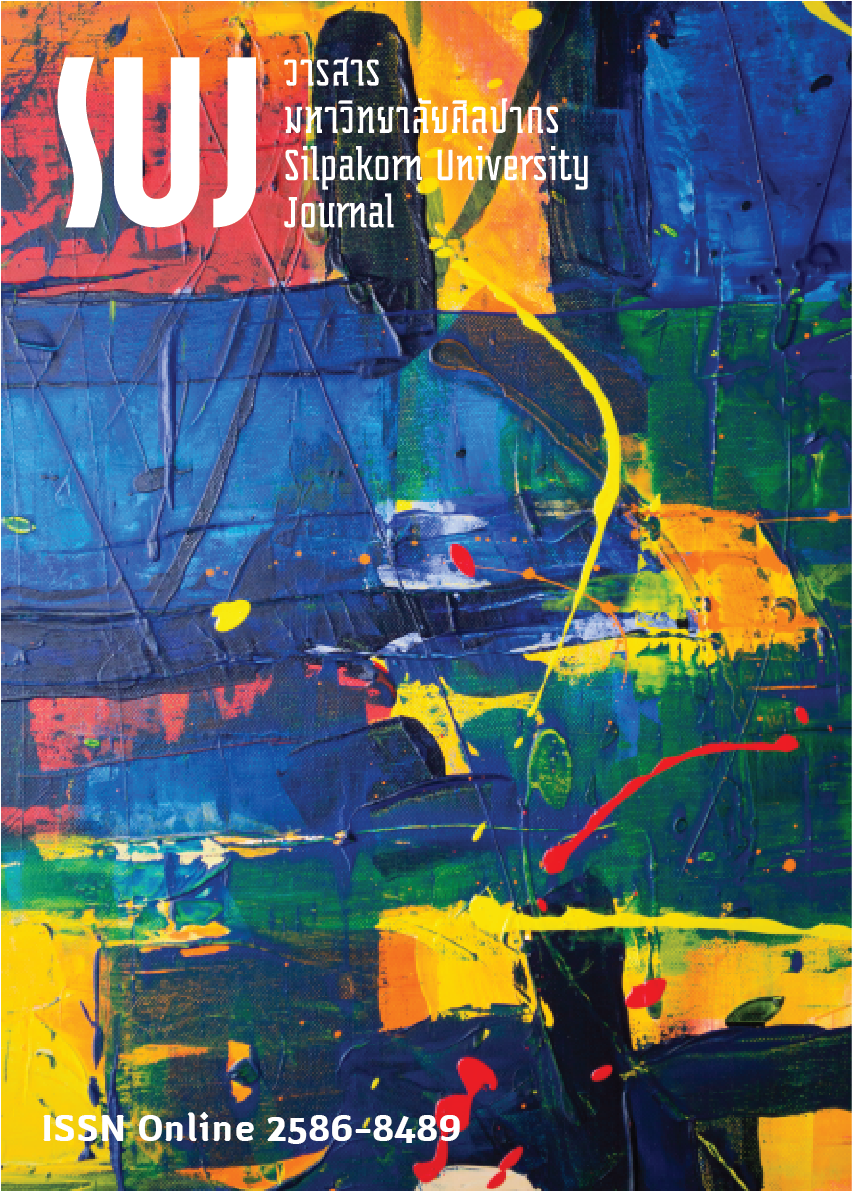แนวทางส่งเสริมการท่องเที่ยวผ่านละคร : กรณีศึกษา ละครโทรทัศน์เรื่อง “บุพเพสันนิวาส” (The approach to promote tourism through drama: a case study from “Love Destiny”, Thai television drama)
Main Article Content
Abstract
การวิจัยนี้มีวัตถุประสงค์ เพื่อศึกษาความรู้ที่ได้จากสื่อละครโทรทัศน์เรื่องบุพเพสันนิวาสที่มีอิทธิพล ต่อทัศนคติในการมาเที่ยวแหล่งท่องเที่ยวในละครของนักท่องเที่ยว โดยใช้การดำเนินการวิจัยแบบปริมาณ เครื่องมือในการเก็บรวบรวมเป็นแบบสอบถามที่ได้จากการศึกษางานวิจัยและเอกสารต่าง ๆ ที่เกี่ยวข้องกับ ความรู้ ทัศนคติ และองค์ประกอบทางการท่องเที่ยว กลุ่มตัวอย่างจากผู้ชมละครมีจำนวน 400 คน ทำการวิเคราะห์ โดยใช้สถิติเชิงพรรณนา ได้แก่ ค่าร้อยละ ค่าเฉลี่ย ค่าความถี่ ค่าส่วนเบี่ยงเบนมาตรฐาน และการวิเคราะห์ ความถดถอยพหุคูณ (multiple linear regression analysis) แบบเส้นตรง ผู้วิจัยพบว่า ปัจจัยด้านความรู้มีอิทธิพล ในทางบวกต่อทัศนคติในการมาเที่ยวแหล่งท่องเที่ยวของนักท่องเที่ยว ปัจจัยด้านความรู้ประกอบไปด้วย 1) ความเข้าใจ (comprehension) 2) การนำไปใช้ (application) และ 3) การวิเคราะห์ (analysis) ปัจจัยเหล่านี้ ส่งผลให้เกิดทัศนคติเชิงบวกสำหรับนักท่องเที่ยว ผู้วิจัยเห็นว่า หากหน่วยงานด้านการท่องเที่ยวและหน่วยงาน ที่เกี่ยวข้อง รวมไปถึงกลุ่มผู้ผลิตละครและสื่อต่าง ๆ ต้องการส่งเสริมการท่องเที่ยวผ่านละคร ควรมีการบูรณาการ ความร่วมมือกัน โดยหน่วยงานด้านการท่องเที่ยวอาจเป็นผู้เลือกพื้นที่ท่องเที่ยว กิจกรรม ทัศนคติและแนวทาง ต่อการท่องเที่ยวที่เป็นวัตถุประสงค์หลัก แล้วจึงให้ผู้ผลิตละครมืออาชีพดำเนินการผลิตละครโทรทัศน์ที่สอดแทรก เนื้อหาความรู้ทางการท่องเที่ยว โดยให้ละครโทรทัศน์ที่นำเสนอมีลักษณะเหมือนกับละครโทรทัศน์ทั่วไปทุก ประการ เพื่อให้ผู้ชมที่รับสารรู้สึกกำลังเสพสื่อที่ให้ความบันเทิงโดยสอดแทรกความรู้ โดยผลลัพธ์ที่ได้จะสร้างทัศนคติในทางบวกให้กับการมาเที่ยวแหล่งท่องเที่ยวและเกิดพฤติกรรมของนักท่องเที่ยวที่ดี
The purpose of this research was to study the knowledge gained from tourists viewing “Love Destiny” by using the power of television media as a motivational and image-making tool in order to attract its audience toward tourist attractions. A questionnaires was a main tool for data collection. A questionnaire content and format were compiled from related literature. The 400 samples were tourists who watched this TV drama. The statistical measures included mean score, percentage, frequency, standard deviation, and multiple linear regression analysis. This study found that the knowledge factor played an important role in promoting a positive influence on tourist’s traveling attitudes regarding target traveling itinerary. This knowledge factor comprised, namely, comprehension, application and, analysis. This paper would like to suggest that if the government sector, the state enterprise sector and related sector including the drama and media producers attempted to promote tourism through TV drama, they should cooperate with one another so as to maximize its impact and benefit. Tourist authorities/ agencies could choose the target tourist attraction areas, activities, type of tourists and approaches to tackle with people who were interested. After that, in terms of content and TV drama production, they would be the responsibility of professional TV drama producers. Thus, an outcome of this integration and cooperation would be similar to other mainstream TV soap operas. This outcome was able to promote not only people’s entertainment but also equip them with sufficient knowledge regarding those tourist itineraries. Apart from this, the outcomes of the film could lead to a positive attitude toward related tourism, tourist attractions and improve tourists’ demeanors.
Downloads
Article Details

This work is licensed under a Creative Commons Attribution-NonCommercial-NoDerivatives 4.0 International License.
References
Ap, J. (1990). Residents’ perceptions research on the social impacts of tourism. Annals of Tourism Research, 17(4): 610-616.
Ap, J., & Crompton, J. L. (1998). Developing and testing a tourism impact scale. Journal of Travel Research, 37(2): 120-130.
Bloom, B. S., Krathwohl, D. R., & Masia, B. B. (1984). Bloom taxonomy of educational objectives. London: Pearson Education.
Easterling, D. S. (2005). The residents’ perspective in tourism research: A review and synthesis. Journal of Travel & Tourism Marketing, 17(4): 45-62.
Jiamprachanarakorn, Suriya. (1983). Consumer economics: 112 (เศรษฐศาสตร์ผู้บริโภค: 112). Bangkok: 2books.
Jurowski, C., Uysal, M., & Williams, D. R. (1997). A theoretical analysis of host community resident reactions to tourism. Journal of Travel Research, 36(2): 3-11.
Kertsombat, Thanyawan. (2008). Knowledge, Attitude and Participation of People in Bangkok Toward The campaign of Stop Global Warming In Bangkok (ความรู้ ทัศนคติ แนวโน้มพฤติกรรมการเข้าร่วมโครงการหยุดเพิ่มความร้อนใส่กรุงเทพฯ ของประชาชนในเขตกรุงเทพมหานคร). [Online]. Retrieved April 11, 2019 from https://doi.nrct.go.th//ListDoi/listDetail?Resolve_DOI=10.14457/TU.res.2008.68
Kitpreedaborisut, Boontham. (1992). Social sciences research methodology (ระเบียบวิธีการวิจัยทางสังคมศาสตร์). Bangkok: Chamchuri Products.
Klapper, J. T. (1960). The effects of mass communication. New York: Free Press.
Likert, R. (1967). The human organization : its management and value. New York: McGraw-Hill.
Liou, D. Y. (2010). Beyond Tokyo Rainbow Bridge: destination images portrayed in Japanese drama affect Taiwanese tourists’ perception. Journal of Vacation Marketing, 16(1): 5-15.
Ministry of Tourism and Sports. (2018). Domestic tourism situation by province in 2018. [Online]. Retrieved March 12, 2019 from https://www.mots.go.th/more_news.php?cid=509&filename=index
Moyle, B., Glen Croy, W., & Weiler, B. (2010). Community Perceptions of Tourism: Bruny and Magnetic Islands, Australia. Asia Pacific Journal of Tourism Research, 15(3): 353-366.
Office of the Royal Society of Thailand. (2011). Royal Institute Dictionary version 2011 (พจนานุกรมฉบับราชบัณฑิตยสถาน พ.ศ. 2554). Bangkok: Nanmee Books Publications.
Phuphaibul, Rutja Chokprajakchad, Monrudee., & Phuphaibul, Phuripan. (2015). Attitude Changes among Adolescents after Viewingthe television series “Hormones” (การเปลี่ยนแปลงทัศนคติของวัยรุ่น หลังการดูละครโทรทัศน์ซีรี่ส์ “ฮอร์โมนวัยว้าวุ่น”). Journal of Behavioral Science for Deveopment, 7(1): 153-168.
Ratapat, Jatuporn. (1995). Attitudes and behaviors from media exposure of high school students in Bangkok, Thailand : Case study Public Phone (ทัศนคติและพฤติกรรมการเปิดรับข่าวสารทางสื่อโทรทัศน์ของนักเรียนมัธยมศึกษาตอนปลายในเขตกรุงเทพมหานคร : กรณีศึกษาเฉพาะการรณรงค์เรื่องโทรศัพท์สาธารณะ). [Online]. Retrieved April 12, 2019 from https://dric.nrct.go.th/index.php?/Search/SearchDetail/59009
Rogers, D. (1962). The psychology of adolescence. New York: Appleton-Century-Crofts.
Satsanguan, Ngampit. (1996). Research experience in cross-cultural anthropology (ประสบการณ์การวิจัยทางมานุษยวิทยาข้ามวัฒนธรรม). Bangkok: Chulalongkorn University Press.
Sitthikarn, B. (2009). Development of local authority’s roles in facilitation logistics of community based tourism destinations in Upper Northern Region, Thailand. Bangkok: National Research Council of Thailand.
Triamphongphan, Narumon. (1999). Alternative : The factory staff attitudes towards industrial water pollution (ทัศนคติของพนักงานต่อปัญหามลพิษทางน้ำในโรงงานอุตสาหกรรม). [Online]. Retrieved April 12, 2019 from https://newtdc.thailis.or.th/docview.aspx?tdcid=163264
World Tourism Organization. (2014). UNWTO tourism highlights. Madrid: UNWTO.
Yamane, T. (1973). Statistics: an introduction analysis. New York: Harper & Row.
Zimbardo, P. G., & Maslach, C. (1977). Influencing Attitudes and Changing Behavior. Boston: Addison-Wesley Publishing Company.


